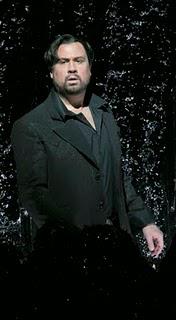
David Daniels as Orfeo.
Photo by Marty Sohl © 2006
The Metropolitan Opera
When Christoph Willibald von Gluck's adaptation of the Orpheus myth arrived on a Viennese stage in 1762, it signalled a new way of composing opera. Gluck's flawless fusion of music and text eschewed the baroque style, emphasizing storytelling over ornamentation.
This is a signature role for this fine American countertenor, one he created when this production premiered in 2006. Kate Royal is Euridice, and Lisette Oropesa is Amor, the winged representation of love. This performance uses the original version of the opera, with the Italian libretto.
Mark Morris' production features an astonishing array of costumed historical figures, arranged on tiers above the stage. These choristers help chronicle the story of Orfeo's grief at the death of Euridice, and his determination to go down into the underworld to get her back. Spectacular ballet sequences and astonishing images are reasons to see this innovative staging.
Part of the problem with recommending a recording of this particular opera is that most of the ones on the market are of different versions of the many revisions. This can be catnip for a collector but difficult to sort out at first. Here's a quick guide to the complexities of Orfeo on CD.
Recording Recommendations:
Orfeo ed Euridice
Munich Bach Orchestra cond. Karl Richter (DG, 1968)
Orfeo: Dietrich Fischer-Dieskau
Euridice: Gundula Janowitz
Amor: Edda Moser
This intriguing recording of the 1862 version of the opera offers a unique solution to the problem of casting Orfeo. Dietrich Fischer-Dieskau, the dark-voiced baritone reknowned for his interpretation of German lieder, offers a powerful interpretation opposite the soaring voice of Gundula Janowitz.
English Baroque Soloists cond. John Eliot Gardiner
Orfeo: Derek Lee Ragin
Euridice: Sylvia McNair
Amor: Cynthia Sieden
One of John Eliot Gardiner's two versions of this opera on disc. Here, the English period performance expert pairs Sylvia McNair with countertenor Derek Lee Ragin with glorious results. This is the closest recording to the version of the opera being performed at the Met.
Orphée ed Eurydice
In 1774, the opera was rewritten for Paris, with the part of Orfeo changed from a castrato to a high tenor. This performance uses the original version of the opera, with the Italian libretto and a countertenor in the male lead.
Coro y Orquestra Sinfonica de Madrid cond. Jesus Lopez-Cobos
Orphée: Juan Diego Flórez
Eurydice: Ainhoa Garmendia
Amor: Allesandra Marianelli
When you're casting a high tenor in an opera, there are few better than Juan Diego Florez, who just completed a run in the Met's first-ever production of Rossini's Le Comte Ory. Mr. Florez' performance makes a compelling case for the French version of this opera, in this live recording under the experienced baton of Jesus Lopez-Cobos.
Orphée ed Eurydice (Berlioz version)
San Francisco Opera cond. Donald Runnicles
Orphée: Jennifer Larmore
Eurydice: Dawn Upshaw
Amor: Alison Hagley
In 1859, Hector Berlioz revised the opera further, rewriting the part of Orphée for a mezzo-soprano to sing and modernizing the orchestration in accordance with his own theories of instrumentation. Berlioz was a brilliant orchestrator, and his version is well worth hearing. Recommended for those who prefer their 18th century operas with a 19th century orchestration. Donald Runnicles leads an excellent cast.
Orfeo et Euridice opens April 29.

